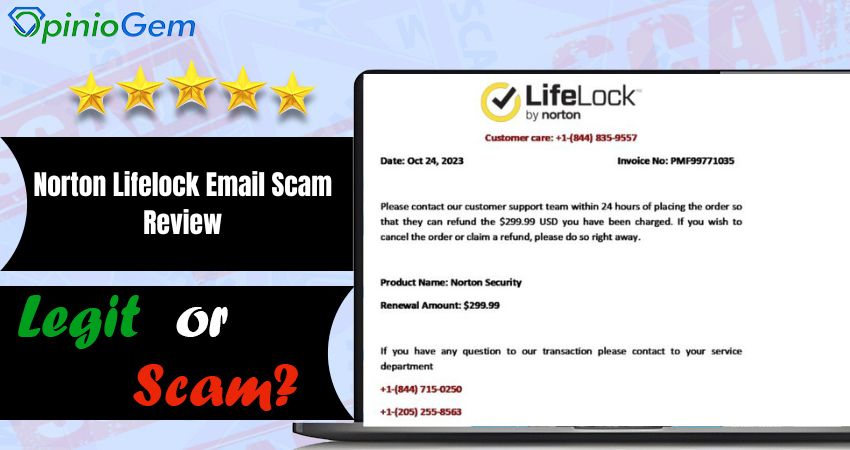Many people reported that they got an email, including notifications about renewing an antivirus system. They make these emails look like official notifications from Norton LifeLock, a real cybersecurity company, claiming that approximately $400 has been charged to their account for the service.
What is Norton LifeLock?
Norton LifeLock is a well-known cybersecurity software that helps protect your identity and keep you safe online. It offers services like identity theft protection and a secure VPN. Norton LifeLock has a strong reputation for being reliable and has been trusted for many years to guard against cyber threats.

How Does the 360 Lifelock Scam Work?
This scam targets unsuspecting people through a series of calculated steps, designed to create panic and confusion, leading victims to give away their personal and financial information. Here’s how it works:
Initial Contact
It all begins with an email that appears to be from Norton Lifelock. The message informs you that the user’s credit card will be charged for a trial plan the user supposedly forgot to cancel.
Fake Customer Support
The email includes a phone number to call if the user believes the charge is a mistake. When a user calls, a scammer answers, pretending to be a customer support representative from Norton Lifelock.
Remote Access
To resolve the issue, the scammer requests remote access to the user’s computer, claiming they need to process your refund. Once granted access, they may move your mouse around and open various files to create the illusion that they are working on your problem.
The Refund Trick
During this process, the scammer informs you that the refund is being processed. They direct you to check your bank account to confirm the refund. However, instead of a small refund (e.g., $24.99), a large amount, such as $2499, appears to have been deposited. This large sum is part of the trick.
Repayment Request
The scammer then explains that a mistake has been made, and the user needs to return the excess money. They might ask you to send the money back via CashApp or another money transfer app. The goal is to make users send money quickly before they realize no actual deposit was made.
Long Phone Calls
Throughout this process, the scammer keeps the user on the phone for hours, creating a sense of urgency and pressure. By then, the scammer may have already accessed sensitive information from your computer, including your credit card and bank account details.
Read: Band of Horses Jobs Review
Norton Lifelock Scam Reddit Reviews
- A user reported receiving a suspicious email with an attachment. They clicked on it, found no phone number to call, and now fear they might have malware on their phone.

- One user clarified that “renewal” doesn’t necessarily mean an initial charge. Some companies offer free trial periods that convert to paid subscriptions, calling this transition a “renewal.”

- Acc. to the user the email was sent from an address with random letters, which raised red flags for the user.
- When the user said they would cancel through their bank, the caller became persistent. The user suspected it was a scam to gain personal information and hung up.

What to Do If You Fell for a Scam Email
Falling for a scam email can be a stressful experience, but taking immediate and strong action can help minimize the damage. Here are the steps you should follow to protect yourself and your information.

Close Compromised Accounts
If you provide sensitive information, such as your bank account details or credit card number, contact your financial institutions immediately. Inform them about the scam and request to close or freeze the compromised accounts.
Report the Scam
Notify your local police department about the scam. Be prepared to provide all relevant information, including copies of the scam email, any correspondence with the scammers, and any transactions made.
Notify Credit Bureaus
Contact the major credit departments —Equifax, Experian, and TransUnion—to place a fraud alert on your credit report. This alert warns creditors to take extra steps to verify their identity before opening new accounts or making changes to existing ones. It can help prevent identity theft and unauthorized use of your personal information.
Monitor Your Accounts and Credit Reports
Regularly check your bank statements, credit card statements, and credit reports for any suspicious activity. Look for unauthorized transactions, new accounts you didn’t open, and any changes to your personal information.
Update Your Security
Change your passwords immediately, especially for any accounts that may have been compromised. Use strong, unique passwords for each account, and consider enabling two-factor authentication for an added layer of security.
Inform Relevant Parties
If the scam involved your work email or business information, notify your employer or IT department. They can take steps to secure the company’s network and prevent further breaches.
Read; Zareviewer.com Review
Norton Lifelock Email Scam Review

Our Opinion
To protect yourself from the Norton Lifelock scam, learn the signs and stay vigilant. Always verify emails and never let unknown people access your computer. If you fall for a scam email, act quickly: close compromised accounts, report the scam, notify credit departments, monitor your accounts, update your security, and inform relevant parties.
You should also be aware of these types of Scam:
Trimova Weight Loss Drops Review

